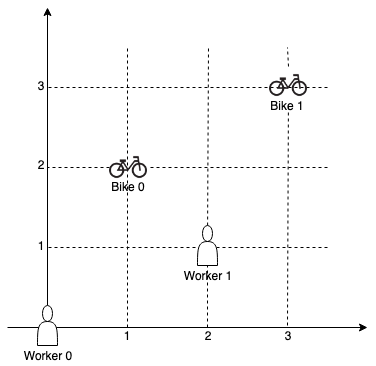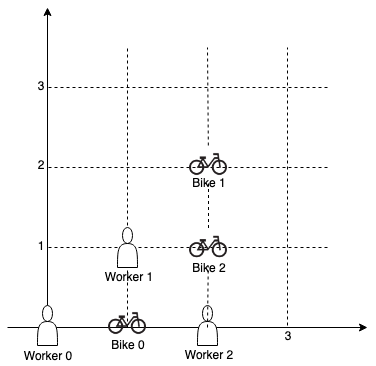Campus Bikes
Created: October 14, 2019 by [lek-tin]
Last updated: October 14, 2019
On a campus represented as a 2D grid, there are N workers and M bikes, with N <= M. Each worker and bike is a 2D coordinate on this grid.
Our goal is to assign a bike to each worker. Among the available bikes and workers, we choose the (worker, bike) pair with the shortest Manhattan distance between each other, and assign the bike to that worker. (If there are multiple (worker, bike) pairs with the same shortest Manhattan distance, we choose the pair with the smallest worker index; if there are multiple ways to do that, we choose the pair with the smallest bike index). We repeat this process until there are no available workers.
The Manhattan distance between two points p1 and p2 is Manhattan(p1, p2) = |p1.x - p2.x| + |p1.y - p2.y|.
Return a vector ans of length N, where ans[i] is the index (0-indexed) of the bike that the i-th worker is assigned to.
Example 1

Input: workers = [[0,0],[2,1]], bikes = [[1,2],[3,3]]
Output: [1,0]
Explanation:
Worker 1 grabs Bike 0 as they are closest (without ties), and Worker 0 is assigned Bike 1. So the output is [1, 0].
Example 2

Input: workers = [[0,0],[1,1],[2,0]], bikes = [[1,0],[2,2],[2,1]]
Output: [0,2,1]
Explanation:
Worker 0 grabs Bike 0 at first. Worker 1 and Worker 2 share the same distance to Bike 2, thus Worker 1 is assigned to Bike 2, and Worker 2 will take Bike 1. So the output is [0,2,1].
Note
0 <= workers[i][j],bikes[i][j] < 1000- All worker and bike locations are distinct.
1 <= workers.length <= bikes.length <= 1000
Solution
Python
import heapq
class Solution:
def assignBikes(self, workers: List[List[int]], bikes: List[List[int]]) -> List[int]:
N = len(workers)
M = len(bikes)
distances = [[] for _ in range(M)]
for i in range(N):
for j in range(M):
distances[i].append((self.calcDistance(workers[i], bikes[j]), i, j))
distances[i].sort(reverse=True)
ans = [None for _ in range(N)]
minHQ = []
takenBikes = set([])
for i in range(N):
heapq.heappush(minHQ, distances[i].pop())
while len(takenBikes) < N:
distance, worker, bike = heapq.heappop(minHQ)
if bike not in takenBikes:
ans[worker] = bike
takenBikes.add(bike)
else:
# push next closest bike to minHQ for worker
heapq.heappush(minHQ, distances[worker].pop())
return ans
def calcDistance(self, pos1, pos2):
# Manhattan distance
return abs(pos1[1]-pos2[1]) + abs(pos1[0]-pos2[0])